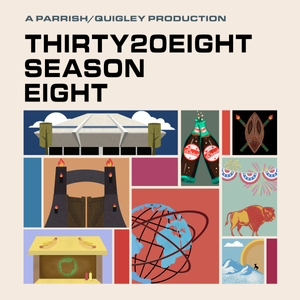
An African Empire in the Americas, part 3 by J. Lorand Matory, Ph.D.; [email protected]
10/01/06 • 30 min
Previous Episode

Esteban Valdes Salazar by Arturo Ramos; [email protected]
Esteban Valdes Salazar is the municipal historian ("cronista") of the municipality of Totatiche, Jalisco. He was born in Totatiche and as an adult moved to Monterrey, Nuevo Leon, where he worked as a verger in one of the local parishes. It was there that his interest in genealogy and historical research began after he was exposed to the disciplines by a parrishioner. While still living in Monterrey, he wrote his first book, Los Valdes de Totatiche, which documents the various branches of the Valdes family in Totatiche and Colotlan, Jalisco. His second book, El sacerdocio ministerial, singular don de la parroquia de Totatiche, Jalisco, documents the descendants of Joseph Cayetano Grano and his six daughters, who are considered pivotal figures in the history of Totatiche and who are the ancestors of most of the illustrious clergy that has come from Totatiche. He has also documented the genealogy of Saint Cristobal Magallanes Jara, who was born and served as priest in Totatiche, and most recently wrote a two volume history of Totatiche. This history, which was published by the Ministry of Culture of the State of Jalisco, can be found in many of the most renowned libraries in the United States. Arturo Ramos is an economist in Washington, DC. His family immigrated to Los Angeles, where he was born, from the vicinity of Totatiche, Jalisco. His interest in genealogy was inspired by his father, who had himself collected and compiled subtantial genealogical information about their family before Arturo joined the effort. Arturo is an active member of the Nuestros Ranchos genealogy group (http://NuestrosRanchos.com) and has traced many of his lineages back to the 17th century. He is currently writing a book which explores the historical ethnography of the Totatiche region and documents his father's genealogy within this ethnological context.
Next Episode

Climate Change and Violence Part 1
Climate Change and Violence? Cautionary Tales from the Pre-Columbian Andes The seminar will take place on January 25, 2008, 4 to 5 PM, in 201 Old Chem Building, West Campus, Duke University, Durham, North Carolina. Dr. Arkush received her PhD at UCLA in 2005. Her research centers on the interplay of warfare, political power, social identity, and ritual in the prehispanic Andes. Her doctoral research focused on the later part of the prehispanic sequence after about A.D. 1000, when many small polities throughout the Andes were apparently engaged in cycles of endemic warfare. Fieldwork on a suite of fortified hilltop sites in the northern Lake Titicaca basin in Peru investigated the regional patterns that emerged from conflictual and cooperative social relationships. This study also examined the chronology of fortification to question current interpretations of the causes of intergroup violence at the time.
If you like this episode you’ll love
Episode Comments
Generate a badge
Get a badge for your website that links back to this episode
<a href="https://goodpods.com/podcasts/nuestra-familia-unida-history-and-genealogy-history-and-genealogy-mexi-6760/an-african-empire-in-the-americas-part-3-by-j-lorand-matory-phd-nfujos-247153"> <img src="https://storage.googleapis.com/goodpods-images-bucket/badges/generic-badge-1.svg" alt="listen to an african empire in the americas, part 3 by j. lorand matory, ph.d.; [email protected] on goodpods" style="width: 225px" /> </a>
Copy




